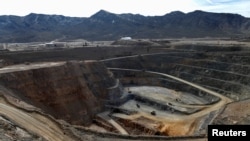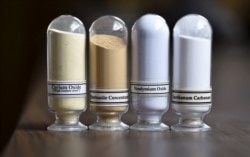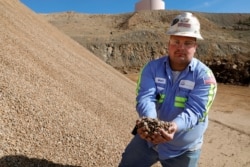In 2021, a more than 70-year-old mine in California’s Mojave Desert will become the center of an effort to revive an American mineral refining system that some say is critical to the country’s national security.
At issue is the availability of rare-earth metals, which are needed for hybrid electric cars, smartphones and certain types of military equipment. In fact, the recently passed National Defense Authorization Act directs most Pentagon systems to use rare earth metals that have been mined and refined outside of China within five years and dictates that the federal government give preference to U.S. suppliers of these materials in government acquisitions.
As part of the U.S. government’s strategy to ensure safe and reliable supplies of critical minerals, the Defense Department has recently announced contracts and agreements with several rare-earth element producers. Among them is MP Materials, owner and operator of Mountain Pass mine, the only rare earth mining site in North America.
Seventeen elements deemed critical to modern society were discovered at the Mountain Pass deposit, which, shortly after its discovery by American engineers in 1949, came to provide more than half of the world's needs for rare earth minerals.
In recent decades, however, China has gradually gained a near-monopoly on these precious metals, controlling about 80% of the global supply chain even though it is home to only a third of the world’s rare earth reserves, according to U.S. Geological Survey data. That is largely due to the country’s domination in processing.
As the U.S. has lost almost all its processing capacity to China, the ore mined in California must be sent to China for processing, making the mine essentially a supplier for the Chinese rare earths industry.
Lost processing capacity
Although they are called rare, these elements aren't so uncommon on Earth. According to the USGS, the elements, while initially considered rare, "are relatively abundant in the Earth's crust."
In its 2020 annual report, the government agency said although some 20 countries worldwide are currently mining rare earths, the U.S., with its 1.4 million-ton reserve, remains home to one of the largest rare earth deposits in the world.
While U.S. bedrock contains an estimated 100 years' worth of deposits at its current annual consumption rate, China is home to nearly all the world’s processing capacity to convert the ores into materials that manufacturers can use.
"The processing has always been the gap through which China has been able to kind of come to dominate rare earth metal production," said Felix K. Chang, a senior fellow at the Foreign Policy Research Institute in Philadelphia.
"The big bottleneck is the process capacity," said Martijn Rasser, a senior researcher at the Center for New American Security in Washington.
Mountain Pass revival
Since its 2002 closure as a result of environmental restrictions and competition from Chinese suppliers, there have been several attempts to revive the legendary Mountain Pass mine.
In 2008, a privately held company called Molycorp Minerals was formed to reopen the site. For a few years the effort looked promising when Beijing restricted rare earth exports to Japan over a diplomatic dispute in 2010. The prices of rare earth on the international market were up and Molycorp’s stock soared.
However, after China started to increase rare earth exports in 2013, the company was struggling to stay solvent. By 2015, the company declared bankruptcy and was reorganized as the Toronto-based chemical manufacturing company Neo Performance Materials with processing facilities in the United States and six other countries, including four plants in China.
The U.S., however, maintains high hopes for open-pit deposit on the southern flank of California's Clark Mountain Range. Among grants worth roughly $13 million the Department of Defense awarded to the three companies, MP Materials, which acquired Mountain Pass in 2017, received the largest amount of approximately $9.6 million.
On the other hand, the much-needed federal investment also could end up benefiting China as well as a Chinese rare earth manufacturer. Shenghe Resources Holdings owns about 10% of MP Materials. According to a U.S. Securities and Exchange Commission filing, one of the MP Materials' businesses is to "sell its rare earth concentrate products to Shenghe for further distribution to various downstream refiners in China."
Dr. William A. Saxton, founder and chairman emeritus of the American NGO Citizens for National Security, says among the many problems that U.S. faces in reviving the industry are environmental concerns.
"We can mine, but we cannot process it because there are several problems, one of which is the problem of toxic waste," Saxton told VOA in a telephone interview. He said hundreds of thousands of acres of federal land were withdrawn from exploration, and increased regulations caused the granting of multiple permits to take from seven to 10 years.
Improving on that timetable, he said, will require overcoming objections from environmental organizations and government agencies.
This story originated in VOA's Mandarin Service.






